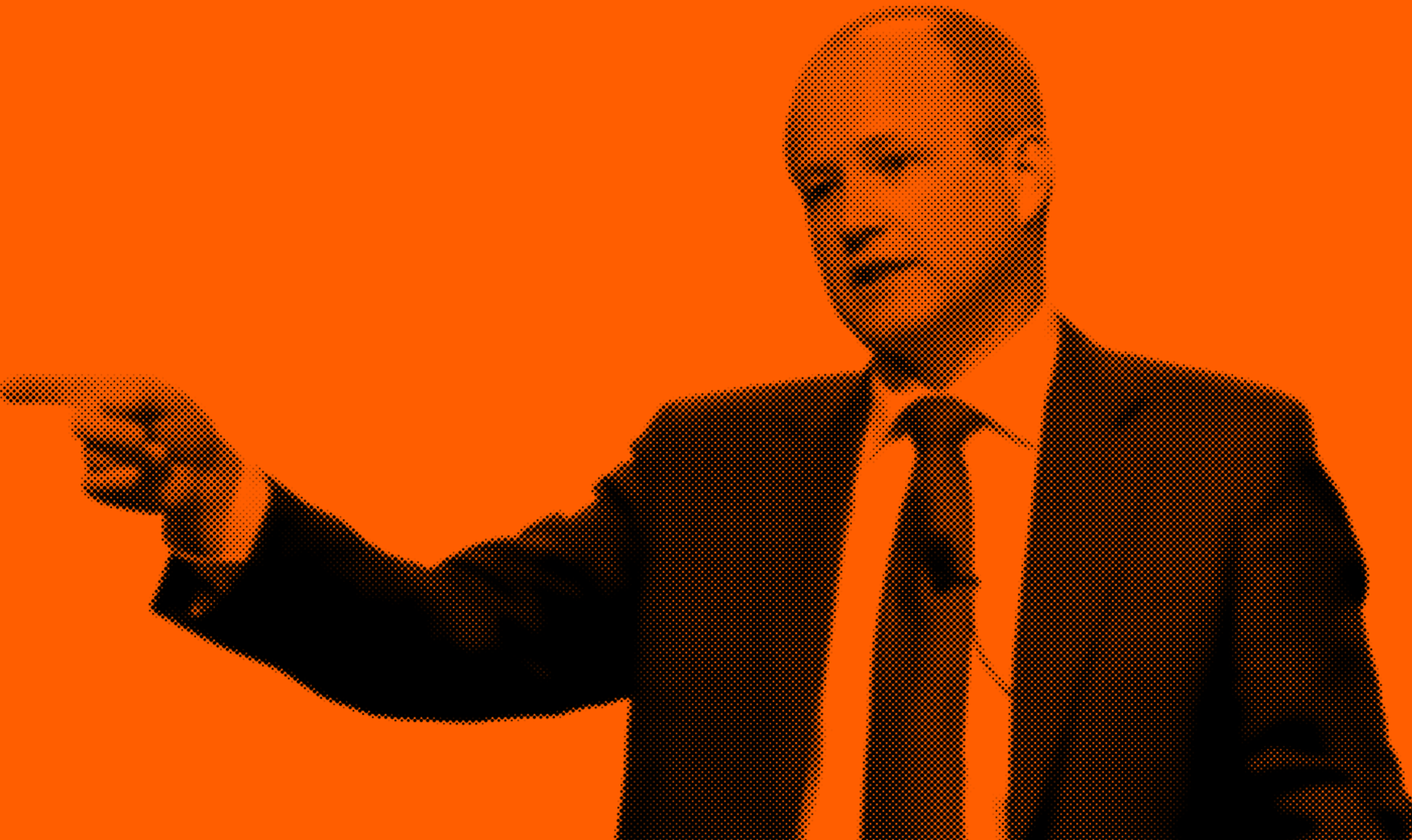
‘I’m a bad boy’: The Stephen Carter story
For better or worse, he’s altered Alberta politics.
Stephen Carter wants to talk.
He’s heard that I’m writing a profile of him, no doubt from one or more of the people from his past and current orbit whom I’ve been reaching out to for months. First he tries Sprawl editor-in-chief Jeremy Klaszus: “So, what’s up? You calling me soon?” Then me, a few days later: “Whatcha up to?”
Whatcha up to. It’s almost playful, like a game.
When I receive this message, I have never previously interacted with Carter. I’ve also never had a profile subject reach out before I contact them, which is typically after months of reporting around the edges.
If these messages feel odd, they also seem on-brand. Carter could have waited, knowing I would contact him eventually, but he preferred to make the first move. To let us know he knew what we were up to, that we couldn’t keep Stephen Carter in the dark. Both messages also came in the form of direct messages on Twitter, his cherished arena, where he has repeatedly gotten in trouble for saying things he shouldn’t.
Stephen Carter wants to talk. And when he talks, people listen.
Carter is probably the most well-known non-candidate political personality in Alberta. His associated victories have been splashy ones, unlikely ones, history-making ones: Danielle Smith, Alison Redford, Naheed Nenshi, Jyoti Gondek. He has been lauded as a brilliant campaign mastermind with a knack for spotting paths to victory.
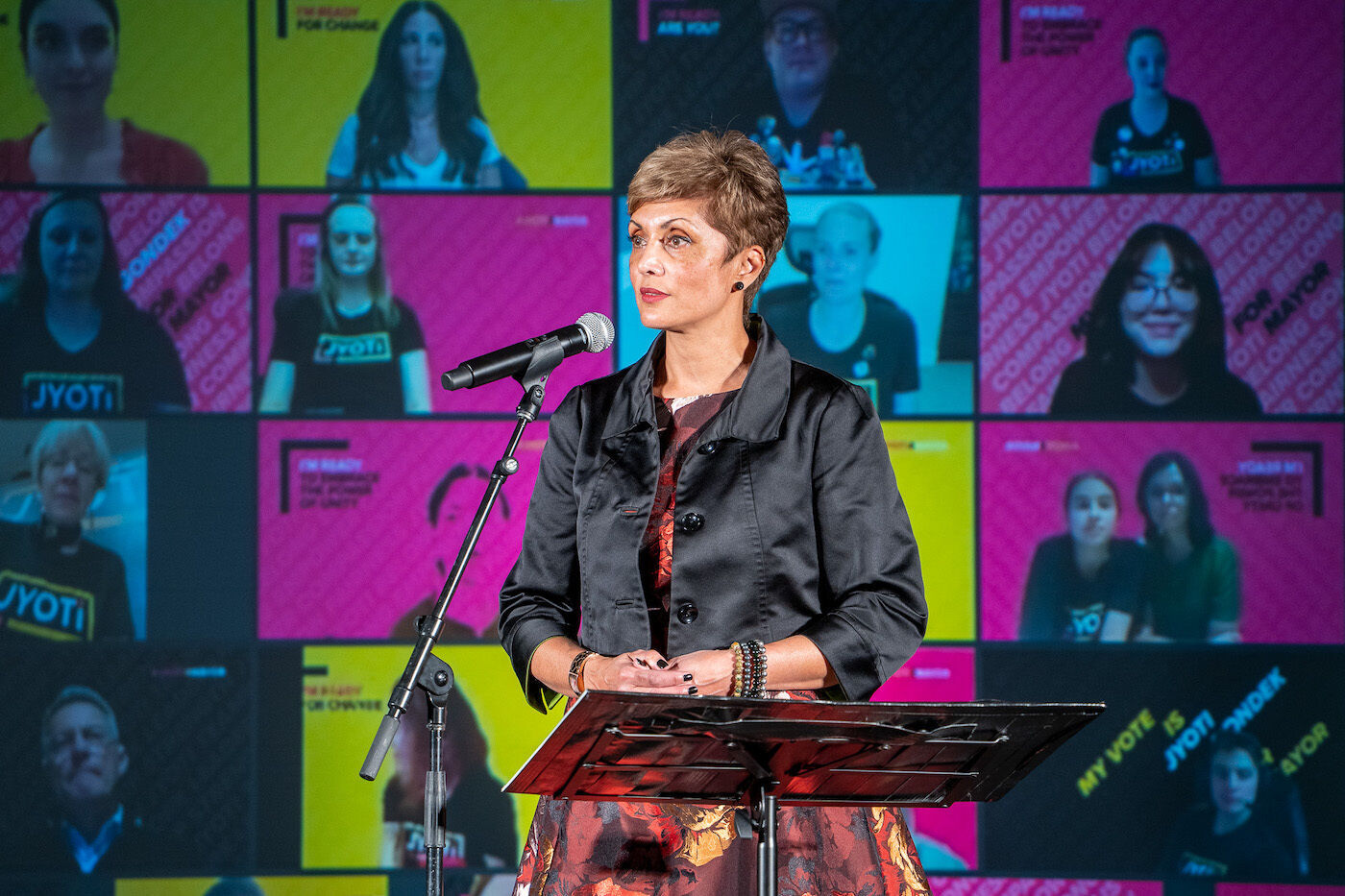
His falls from that pedestal have been at least as frequent and public. If Carter’s string of successful campaigns indicate a sharp political mind and a talent for strategy, the other patterns in his career tell important counter-stories: graceless departures from three high-profile chief of staff positions, interpersonal conflict, and an aggressive online persona that most strategists would advise a candidate against.
His critics dismiss him as an overrated self-aggrandizer, but he has helped elect the last two mayors of Calgary—both visible minorities, one the city’s first Muslim leader, the other the first woman—and the first woman premier of Alberta. He is good at winning campaigns, as even those who disdain him admit.
He is a controversial figure, having twice collected six-figure severance packages paid for by the public while his former events company never paid back the hundreds of thousands of dollars it owed around town to individuals and organizations, from small businesses to the University of Calgary. This stemmed from the failure of back-to-back events (waterskiing and the Dalai Lama) Carter organized in 2009.
I think he might be more comfortable having enemies than the average person.
This story is based in part on interviews with people who have known or worked with Carter in various capacities throughout his life, from politics to his event planning business. Most declined to speak on the record, citing Carter’s penchant for public fights and legal threats. “Watch your back,” one political figure warned.
When I meet Carter for coffee in Inglewood, it’s the most surreal interview I’ve done in 14 years of journalism.
He wants to talk—and does, for three hours. And I listen, writing notes, glancing down to make sure I’m still recording, trying not to look surprised when he says sharp, even derogatory things about Redford, Nenshi, Gondek, the left, his critics on Twitter—all on the record.
“I think Carter likes to have an antagonistic/playful place in the world,” says Rebecca Northan, an actor and friend who has known Carter since university.
“I think he might be more comfortable having enemies than the average person.”
An early flair for the theatrical
Born in Calgary in the summer of 1969, Stephen Blair Carter grew up in the northwest neighbourhood of Collingwood. His path to politics and notoriety was circuitous: a flair for the theatrical initially led him to the arts. He received a bachelor’s degree in commerce from the University of Calgary in 1994 but focused his studies nearly as much on theatre as on business.
After university, he worked with the Vocational and Rehabilitation Research Institute at the University of Calgary to start People’s Theatre, a company which ran classes and theatre productions with developmentally disabled people alongside other actors.“It was a really special experience to to meet people of different abilities in this unifying arena of a theatre rehearsal hall,” says Northan, who participated in the shows.
I know that when people get angry with me, they’re not coming to me because of a well-researched position.
After kicking around the theatre scene for a while—and bartending at Coconut Joe’s on Electric Avenue—Carter got a job as acting (pun not intended) director of development at Theatre Calgary.
It was here that he met Heather McRae, who worked as a development associate.
“I was her boss,” he tells me, adding with feigned outrage: “Scandal!”
A few months before they surprised their friends with a backyard wedding in 1997, Carter and McRae started an events management company. It operated as a numbered company called 745917 Alberta Ltd. until 2006, when they registered the name Carter McRae Events. Carter hadn’t really wanted that career, but while he continued to be involved in the arts—including chairing the Calgary Professional Arts Alliance and running Pleiades Theatre before it became Vertigo—it soon became clear which path offered more opportunity.
The duo built up a reputation for their company and drew steadily larger contracts: corporate events, festivals, whomever was hiring.
One 2006 corporate event at Hotel Arts for which Carter McRae was contracted turned tragic. A mechanical calf roping ride malfunctioned, striking a summer student for the host company in the head and killing him. Carter’s company did not provide the machine and faced no legal liability; but he did personally “evaluate” the device, and, judging it to be dangerous when mixed with a crowd and alcohol consumption, ordered it fenced off.
The trial judge’s decision notes twice that Carter McRae called themselves “a world class event planner,” and that “they did not foresee the hazard the calf roping machine presented to the operators, even though they did a hazard assessment and assisted with the set-up of the machine.”
The judge states that the event host, XI Technologies, “was entitled to expect some degree of expertise from Carter McRae insofar as assessing any hazard or risks the calf roping machine presented.” However, the decision also notes that “the significant and deadly risk the machine presented to the operators, given its faulty condition, went unnoticed by a significant number of professionals.”
The double whammy of 2009
By 2009, Carter McRae had landed some big contracts. Two, in particular, stood out: the world waterski championships and the Dalai Lama.
The latter was especially a big deal. Carter McRae would help bring a world leader, one of the most famous people in the world, to Calgary. And it would destroy their company.
The waterski event was held that August at Predator Bay, an artificial pair of lakes just south of the city designed specifically for waterskiing. Carter branded the event Drenched Fest. He brought in bands like Finger Eleven and Hedley to perform, and, as usual, hired multiple contractors to take care of everything from graphic design to logistics.
Advance ticket sales, however, were low. The global recession had taken hold, and disposable incomes had shrunk. The organizers hoped people would turn up once it started, but then it poured rain for the first two days. The whole thing was a bust.
According to Carter, the non-profit organization that hired Carter McRae had assured him that they had a $200,000 bank guarantee that didn’t exist. The organization went broke, and Carter told the Herald at the time that his company was shortchanged almost $500,000 despite the event bringing in over $1 million.
Meanwhile, the Dalai Lama was coming to town six weeks later. He was to host a speaking event at the Saddledome on September 30, then headline a conference hosted by the University of Calgary on October 1 that also included former South African leader F.W. de Klerk. There was also a concert featuring k.d. lang and Bryan Adams.
I didn’t steal anything. I didn’t take anything that wasn’t mine.
But things weren’t looking good.
The Dalai Lama doesn’t charge speaking fees, but his expenses get covered by the host organizers—everything from a private plane to hotels and a very specific chair for the stage. On top of that, ticket sales were soft. On August 31, three weeks after the waterski event and one month before the Dalai Lama, Carter tweeted at Jann Arden: “@jannarden - enjoying your tweets! Wondering if you would be interested in a project with the Dalai Lama? www.dalailamacalgary.com. HOPE SO!”
Carter says he fought with the Dalai Lama’s people for a crucial additional event, a $5,000-a-head gig where the city’s elite could hobnob with the man himself and thus offset the overall costs—something the Dalai Lama had agreed to in other cities. Carter flew to New York, where they were headquartered, to press the issue. But he says they refused because his was a for-profit business, albeit one hired by a public university. (The Dalai Lama’s team did not respond to a request for comment.)
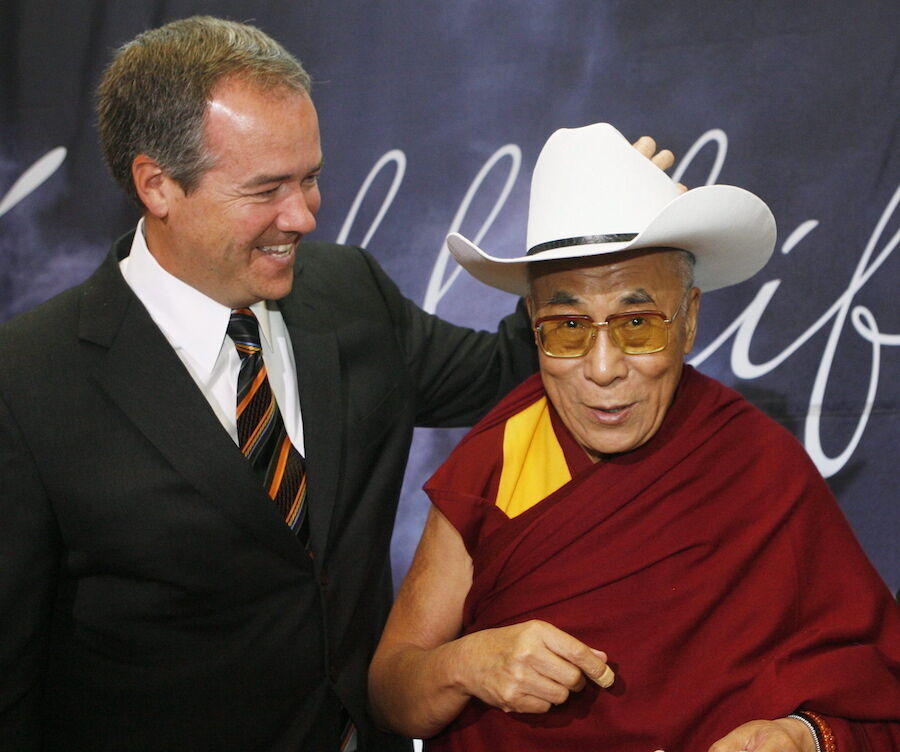
With both events, Carter McRae had hired many private contractors, large and small. They had by and large been working on credit. Carter said he and McRae lost $200,000 of their own money in the debacle.
The company went insolvent, which means you can’t pay the debts you owe, even if you sell all of your assets. A lot of people whose expenses were supposed to be covered by Carter McRae lost thousands of dollars. The Globe and Mail reported that “some performer expenses have not been paid, including those of Mr. de Klerk.”
Carter McRae was sued by several of the largest creditors the following year, and the court ordered writs of enforcement for $568,663.30, including $406,216.49 to the University of Calgary. None of it was paid. In a statement to The Sprawl, the university acknowledged the writ of enforcement for that sum against Carter’s company, but added that it “cannot comment on efforts to collect this amount.”
Carter still resents the fact that the contractors his company owes money to, including people with small businesses out of pocket for tens of thousands of dollars, blame him for what happened.
“Some of them are still mad,” he says. “Very mad. We tried to do our best for people, but we didn’t have any money.”
One small contractor told me he considered Carter a friend, and found it strange when he and McRae “ghosted” him when he tried to collect what he was owed. He said they never responded to him, never told him themselves what had happened, and never apologized. The contractor said he lost upwards of $70,000.
We tried to do our best for people, but we didn’t have any money.
“I don’t think I did anything wrong,” says Carter, pointing out that he personally lost $200,000 as well as his company. “I didn’t steal anything. I didn’t take anything that wasn’t mine. I didn’t make sure that I came out better than everybody else.”
He blames the economic downturn, the bad weather, the waterskiing organization, the Dalai Lama’s staff. But he also says if you have a problem with what happened, we’re all to blame.
“We’ve made decisions as a society. We’ve created the ability to go insolvent and not go to the poor house,” he says.
“We would prefer to have more entrepreneurs because it is better for the society overall. And we do so knowing that 50% of businesses are going to fail at some point. We say there is a consequence to that failure, but that consequence is minimal, and it is borne by other people, but it is not going to be borne by the society as a whole.”
Carter would lose more than money and his business in the affair. It would eventually cost him something he didn’t yet have when those events took place: the highest-profile job in politics he’d ever had.
Ideologically anti-ideological
Politics, to Carter, is simultaneously a venue for effecting positive change in the world and a tremendously enjoyable bloodsport. Few political figures of his profile, whether candidate or backroom operative, so unabashedly relish the combat of the arena.
“When I started in politics in ’97, it was like crack cocaine to me,” he says.
Carter wears his own politics on his sleeve, passionately advocating for what he calls “pragmatism,” others might call centrism—a business-friendly progressivism largely in step with the values of Redford, Nenshi and Gondek.
Carter views himself as simply taking common-sense, practical approaches to challenging issues, rather than adhering dogmatically to a predetermined ideology. He denies that this amounts to an ideology, but it overlaps quite neatly with so-called “radical centrism,” a form of politics that argues that the middle road is not just the best way forward but the only defensible one. Compromise and moderation rule the day.
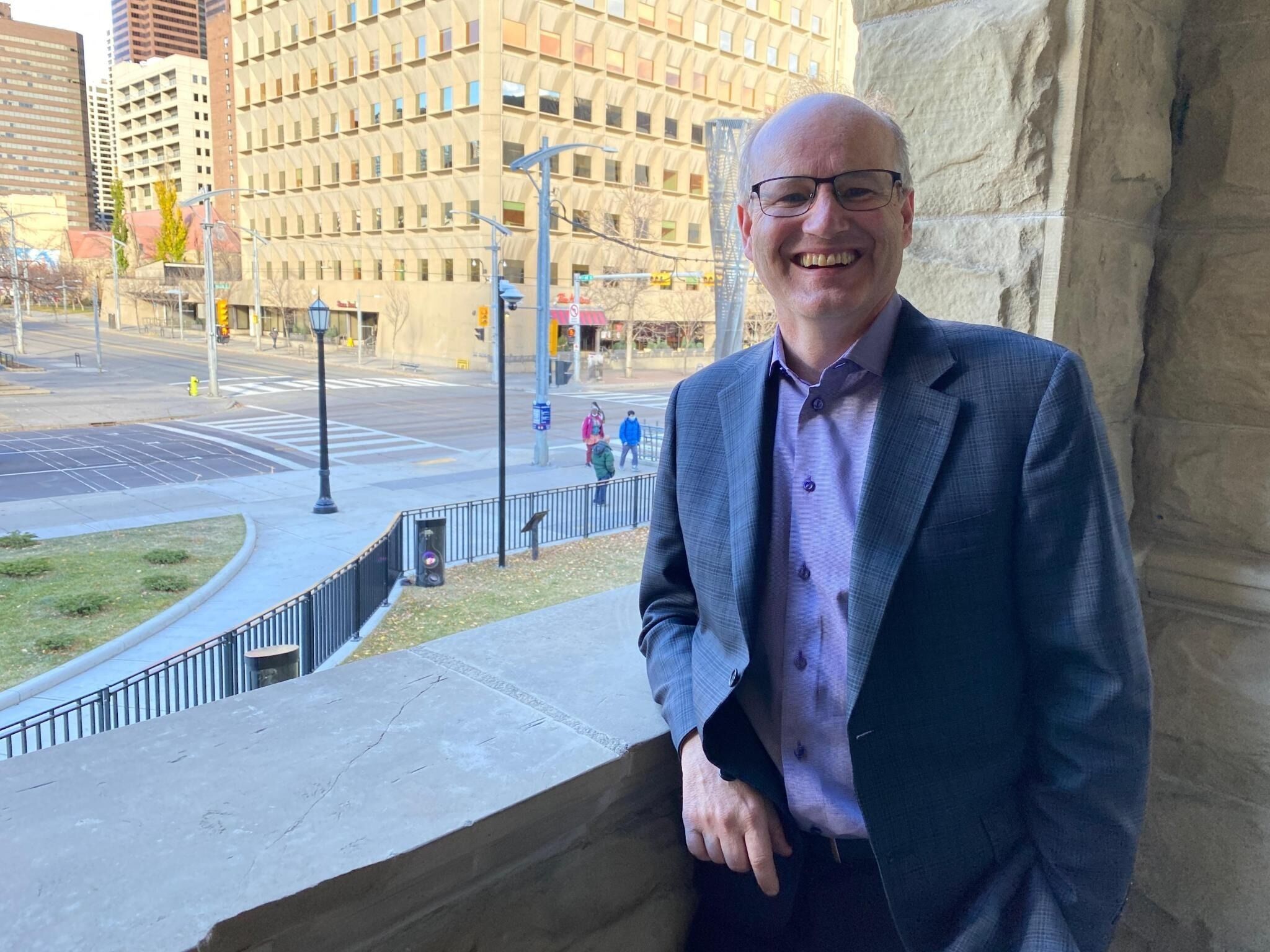
This approach wins Carter criticism from both the left and the right; he sees each as equally unreasonable, further justifying a Goldilocks approach. This dynamic, paired with Carter’s aversion to compromise or apology, and his penchant for what he sees as aggressive banter and humour, invariably lead him into trouble in his favourite forum: Twitter.
“I think I'm aggressively funny when I want to be funny,” he tells me. “My Twitter account is probably the best it's ever been right now.”
His online persona has evolved over the years, from excited tweets about pork buns in 2009 that went unnoticed, to a more divisive approach that gets plenty of retweets and replies and has earned him 15,000 followers.
Politics and Twitter often intersect for Carter, and frequently not in his favour. One incident from early this year, while he was still Gondek’s chief of staff, offers a case study.
On a brutally cold New Year’s Day, 2022, Druh Farrell tweeted about the record number of unhoused Calgarians in tents, mentioning that the city had planned to temporarily house people in hotel rooms during the pandemic. Carter responded: “Or they could go to the shelters. Currently every shelter has open spaces.”
The subsequent dialogue resulted in a user sharing a CTV story about vulnerable people being kicked out of the Sunalta LRT station during the cold snap, suggesting that, at a minimum, perhaps the city should stop doing that.
“Even when they are smoking meth? That part was left out of the story,” Carter tweeted, setting off a firestorm as people accused him of lacking compassion for addicts, contributing to stigmatization and not understanding the complexities of homelessness.
When I started in politics in ’97, it was like crack cocaine to me.
Ironically, given his tweet, Carter says he supports “housing first”—a popular strategy that inverts the traditional approach of requiring people to qualify for housing assistance by first getting clean or finding work. Instead, it gives people the safety and reliability of a home, and then provides social supports such as counselling and addiction treatment.
“Housing first? Huge fan,” Carter says. “I think that this provincial government’s take on housing, that you have to be clean before you get in is stupid. If you or I were on the streets, we’d be fucking addicts. Because you’re on the streets! It’s a disaster, your life’s a disaster at that stage. Of course you’re going to be addicted.”
“But house them, and then work on those problems,” he continues. “That’s the order. I don’t think you should use city [transit] facilities as a safe injection site. I think we should have safe injection sites.”
He also said not all of the people taking refuge in transit stations were homeless.
“They’re housed addicts that are going to the party. And the party is occurring at the transit shelter. Like, come on, guys. Surely we can agree that this isn’t a good thing for the people who are doing the drugs, nor for us as a society that can’t use our facilities... But the left wing of Twitter decided I was a prick.”
Thus appears another element frequently at play: a powerful reflex towards doubling down in the face of any criticism, legitimate or not.
“I know that when people get angry with me, they’re not coming to me because of a well-researched position about what my ideas are or what I’ve stood for or what I’ve done. They come after me because I’m high enough profile that they can punch me instead of punching down,” he says.
“Name one person coming after me with a reasoned argument. The ‘Mean Girls’ of Twitter, the right wing, Brett Wilson.”
Many who have criticized Carter have found themselves facing threats of legal action. It’s a tactic that he says he uses to get people to apologize—though he admits he’s never actually sued anyone.
Five days after the “smoking meth” tweet, Carter says he was ordered to issue an apology by Gondek, though it’s clear he doesn’t feel he did anything wrong.
But Carter wasn’t supposed to end up in municipal politics anyway.
“The issues I care about are almost all provincial,” he says. “Like, I don’t give a shit about municipal issues. ‘Ooh, what’s our zoning going to be?’ I don't give a shit.”
‘Who the hell is Druh Farrell?’
After working for the federal Progressive Conservatives in the late 1990s, doing everything from carrying Jean Charest’s bags to handling Joe Clark’s media, Carter’s first foray into politics as a campaign manager came in 2001, when Druh Farrell offered him that position with her first bid to be Calgary’s Ward 7 councillor.
A leading candidate in that Ward 7 race was Augustine “Gus” Barron. According to Carter, Barron owned property on Memorial Drive and was using it to display prominent signage. “The signs [were] fucking everywhere,” recalls Carter. “We didn’t have any signs in places like that.” This was concerning, because he believed his candidate had a name-recognition problem.
“Who the hell is Druh Farrell? She had just come from the Kensington BRZ… she didn’t have any public persona. And so we created name recognition.”
I don’t give a shit about municipal issues. ‘Ooh, what’s our zoning going to be?’ I don’t give a shit.
In fact, Farrell was already well known in the grassroots of the community, having long been involved in various projects and public committees. Carter says he named his price for the job and received it; Farrell said it was a volunteer position and denied paying him anything, and that he left partway through the campaign.
“Prior to being elected I was a community and business advocate with deep connections to the neighbourhoods I was hoping to represent,” Farrell said in a statement to The Sprawl. “I had a remarkable team of committed volunteers who were instrumental in my success and I’ll be forever grateful to them. I’ve always insisted on running a positive campaign that focused on the issues.”
Fundamentally, there was a disconnect between a hungry young political strategist willing to test the limits in order to win, and a candidate who would rather lose than compromise her values by engaging in what she saw as negative campaigning.
“At the end of the day, she was never very comfortable being a candidate,” said Carter. “She was much more comfortable with the idea of just winning and being Druh Farrell.”
After Carter left her campaign, Farrell won handily with 44% of the vote to Barron’s 20%. She held the seat for 20 years, never losing an election. (She’s currently the NDP candidate for Calgary-Bow.)
Aiding the rise of Danielle Smith
In 2009, two weeks after the Dalai Lama came to Calgary, Danielle Smith won the leadership of the Wildrose Alliance Party by a landslide. It was a surprise: the right-wing party had been fairly fringe since its creation in 2008 out of two even more fringe parties.
But support had been growing. Outgoing leader Paul Hinman unexpectedly won a byelection in Calgary-Glenmore, becoming the party’s sole MLA. Now they had Smith at the helm, a leader with seemingly moderate social values—just what was needed, pundits said, to grow the party’s base beyond rural Alberta.
Carter had known Smith for years. He went to her victory speech ahead of time and, he says, offered some help with the details: changing the lighting, tweaking the stage setup, giving her some speaking points.
“She said, ‘Why is no one else telling me this?’” He was soon hired as chief of staff to the incoming leader.
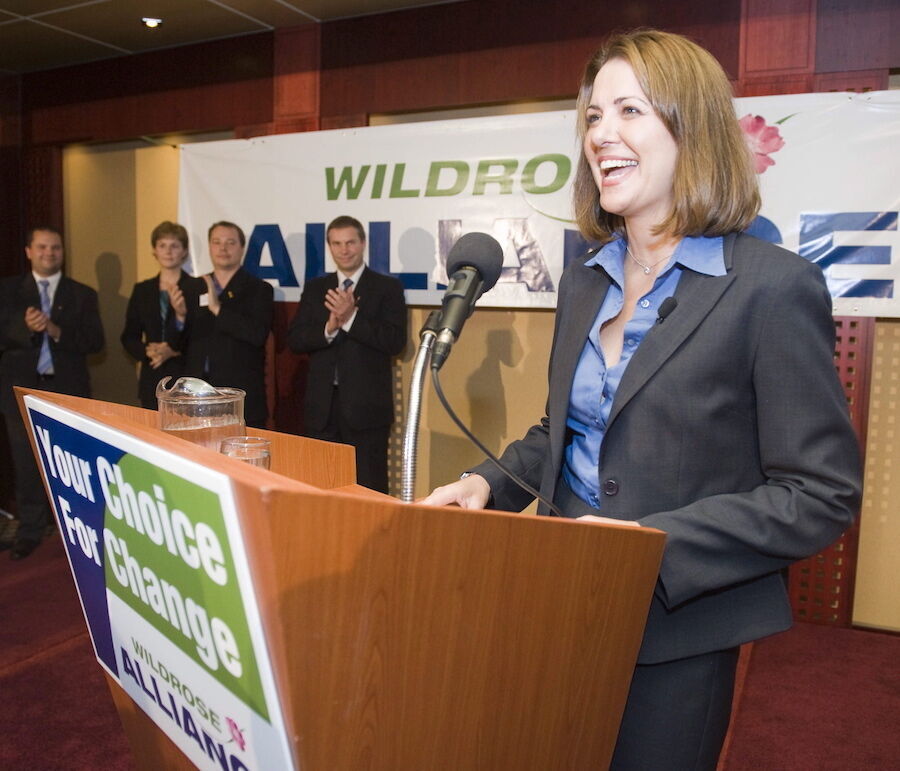
One month later, on November 19, Carter tweeted.
“Just saw da premier making a speech. Dat was quite a speech. Dem media better report it right.”
A second tweet about an upcoming press conference read: “Dem media better be ready for Danielle. Dey better get da story right.”
The tweets were mocking Premier Ed Stelmach, who was raised in rural Alberta as the son of Ukrainian immigrants. His first language was Ukrainian, and he didn’t learn English until he began attending school.
The media grabbed the story and ran for days. Carter apologized and deleted the tweets.
“I pulled it down right away,” he told the Canadian Press. “I’m a bad boy, it was wrong, I’m sorry... I will never do it again.”
Carter told CP he meant to make fun of the media, not Stelmach. But he told me he stands by the point of his tweet: that Stelmach engages in what might be called Ukrainian code-switching, speaking to rural and urban audiences with different accents.
He also said that the lessons he took from the incident were “never apologize” and “never delete.”
Carter resigned as Smith’s chief of staff a few days after the Stelmach tweets, and a month after Smith hired him. Ostensibly the reason was to protect Smith and the party from his debt crisis; he said he quit before they could fire him.
In just a few months, Carter had gone from top of the world to bottom of the heap. He’d lost his business, fallen massively in debt, made a lot of enemies, and blown a high-profile political gig he’d hoped might save him.
But it wasn’t all bad. Four days later, he tweeted: “Spolumbo’s for lunch - things are looking up!”
The Nenshi campaign
In Carter’s telling, Naheed Nenshi, his old university pal, came to him in January 2010 and said he was contemplating a run for mayor.
“And I say to him, ‘Perfect, because I know how to get you elected.’” Carter points to his experience running local business owner Alnoor Kassam’s 2007 mayoral campaign (on which Kassam spent more than $1 million of his own money, and which Carter calls “a vanity exercise”) as a chance to experiment with the new medium of social media and other digital strategies, along with the money to do daily tracking of polling numbers.
One of the more creative tactics Carter deployed for Kassam involved the creation of a “Friends of Dave Bronconnier” Facebook page ostensibly supporting the rival candidate. “Then with, you know, three days left, we flipped it over and said we can’t support Dave. It was so much fun, though no votes were moved.”
Nenshi, however, was hesitant. Carter then joined a different mayoral campaign, which promptly fired him within the week. Attempts to join another campaign were stymied. In both cases, Carter tells me, “some of the money people started calling and saying ‘you gotta get rid of Carter.’”
The lessons he took from the incident were ‘never apologize’ and ‘never delete.’
Things were looking hopeless. “I don’t know how I’m going to do this,” he recalls thinking. “How do I rebuild? No one’s even given me the opportunity to rebuild. My career’s over.”
Carter went back to Nenshi, and this time managed to convince him to run. Carter was officially the strategist, but he said that with no designated campaign manager, he effectively filled both roles.
When this description of Carter’s involvement was told to someone familiar with the workings of the campaign, the person said, after a long pause: “Oh my fricking god.”
The other version of events, which multiple people familiar with the campaign confirmed, is that Carter was hired by Chima Nkemdirim, who was both chair and manager of the campaign. The suggestion that his reputation was tarnished by the collapse of his business was true. But it wasn’t only influential creditors angry about losing money.
“He was persona non grata in the community,” said one source. People didn’t trust him after the Carter McRae debacle.
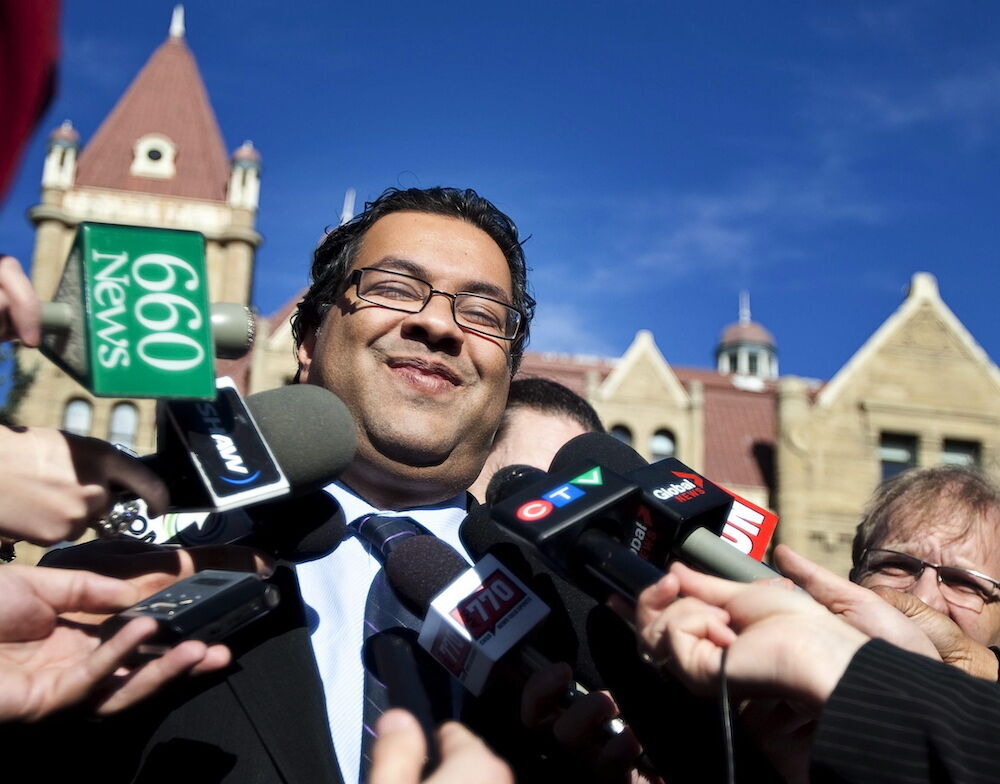
Nenshi’s campaign and eventual come-from-behind victory in 2010 got a lot of attention—heightened by Rob Ford’s election as mayor of Toronto at the same time. The media capital of the country was baffled by how they got stuck with Ford while Calgary elected a brown progressive professor as mayor.
Carter basked in the attention. Now that the campaign was over, however, he was done; Nenshi picked Nkemdirim as his chief of staff. Carter says he didn’t expect to be hired for the role, but he was hurt at being shuffled aside so quickly.
One year later, however, he found another ticket to ride—this time, back in the provincial arena. And this one would make him famous.
The 'wunderkind' arrives
Carter had known Alison Redford since 1997, when they both worked for the federal Progressive Conservative party.
“She was a mentor to me at that time,” Carter says.
Redford was justice minister for Stelmach, who was stepping down as leader. Once again, Carter says, he had to talk a hesitant potential candidate into running.
“I was able to convince her that, at the very least, we’d [finish] in the top three, and that from there, she would at least get back into cabinet. And I wouldn’t leave her with any debt, and we were going to run a really good campaign.”
“We built the best story I’ve ever created in politics,” Carter continued. “Mother of a young daughter, daughter of aging parents. Fuck. That frame can hold everything.” He shakes his head. “And then she walked away from it. Oh my god, like, just insanity. She wanted to be the ‘international premier.’ No one votes for the fucking ‘international premier.’”
Few expected Redford to win; when she did, Alberta suddenly had a woman premier for the first time. Her victory catapulted Carter to political stardom. Suddenly, in the press, he was the “mastermind,” the “architect,” the “genius prince” to the new queen, the “wunderkind” who had “orchestrated” an unlikely victory.
“Welcome back, Carter,” read the headline over a Herald story that noted his remarkable comeback and asked “Who will he give the Carter bump to next?”
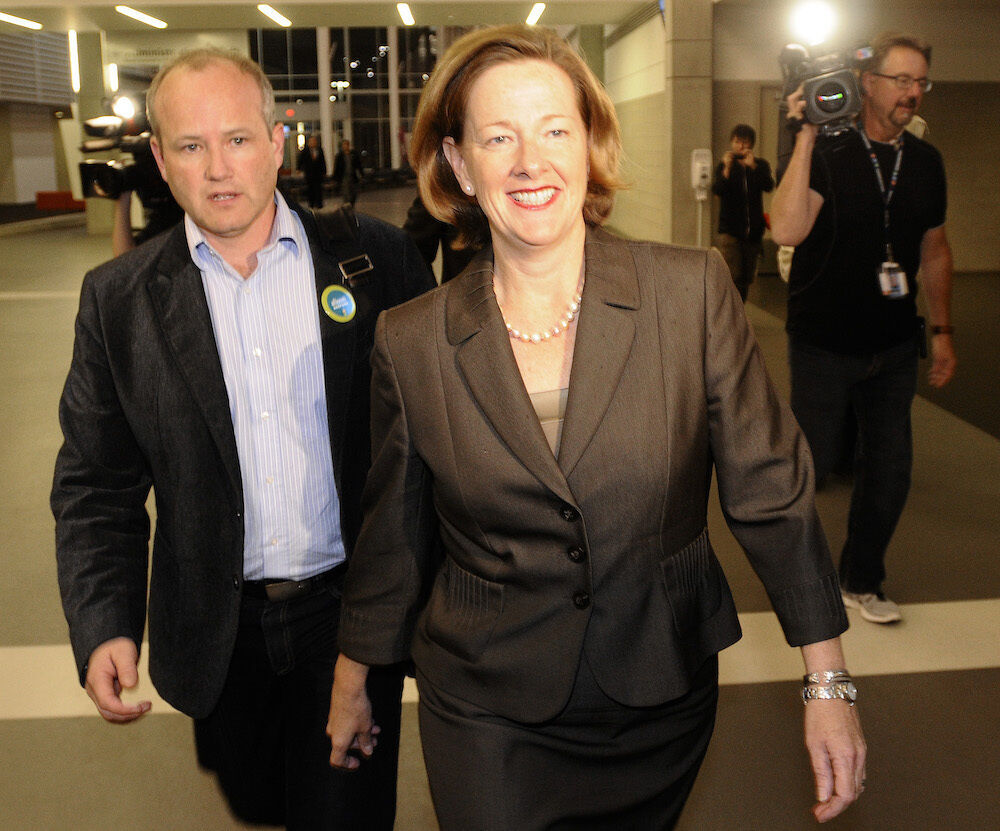
Two years earlier, he’d lasted one month as the chief of staff to the leader of a party with one MLA. Now he was chief of staff to the first woman premier of the country’s fourth-largest province.
The problems started almost immediately—not with him, says Carter, but with Redford.
“She struggled with the victory. Who was she? Who is she? What does it mean to be premier? And she had some rather perverse views on it,” he says.
“We didn’t know how to deal with a premier that was struggling.”
I ask what he means by perverse views.
“‘I’m the premier. I get to decide if I take a second plane to the same place that my caucus is going. Because I don’t want to sit beside my caucus mates and be filled with their inane conversations.’”
He says he was banned from Redford’s car within one week because he wanted to make use of travel time by getting work done: talking about policy or strategy or ministerial directions, when she would rather relax.
“I have a ton of time for people with mental health challenges. We don’t ask for them, they happen. I think they were happening to her.”
What kind of mental health challenges? What exactly does that mean?
“I don’t know, I’m not a doctor.”
Redford did not respond to multiple queries for this story, including a request to respond to Carter’s comments about her.
Carter doesn’t mention that just days after the victory, Rick Bell of the Calgary Sun dug up the story of his company’s $600,000+ debt. The front-page headline was “CHIEF OF STIFF!” under a smiling photo of Carter. The story became an early crisis for Redford.
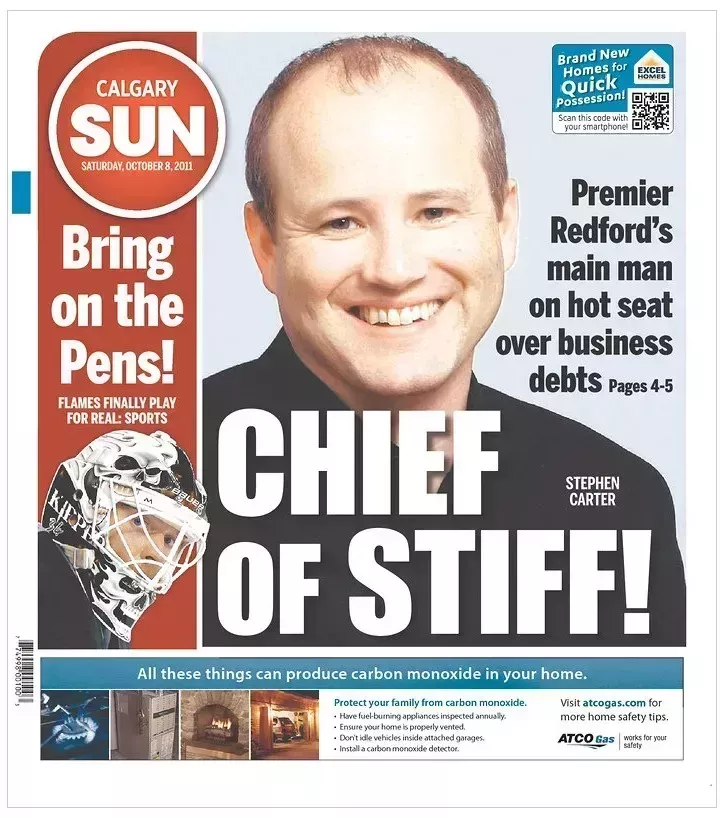
Then came the 2012 provincial election—a political rollercoaster. Smith had spent three years building up the Wildrose. The party now had four MLAs after a series of floor crossings. The Wildrose led polls for much of the campaign. It looked like Smith was about to end the PCs four-decade hold on power.
Then came the “bozo eruptions” from Wildrose candidates, including one who wrote on a blog that gays would suffer for eternity in a lake of fire. Smith’s defense of the remarks, pundits said, helped cost her the election.
The PCs lost five seats and the Wildrose picked up 13, but the election day polling projections were so incorrect that it seemed like a miraculous victory for Redford.
But Carter claims he saw it all along.
“No one believed me. I was running around telling the whole fucking world we’re gonna win,” he says.
“Now, we didn’t win, Danielle lost. I’m not so egotistical as to think I did this single-handedly or anything. But we created the environment where Danielle would lose. And it largely came out of my shop. I did the war room, and we beat the shit out of her for 11 days straight. And we won.”
Then, shortly after helping elect the premier to her own mandate, Carter was fired. Redford chose Farouk Adatia as her new chief of staff; her ex-husband and confidante Robert Hawkes, a mutual friend of Carter’s, delivered the news.
No one believed me. I was running around telling the whole fucking world we’re gonna win.
Carter says Redford “kept me in the tent” after that, hiring him occasionally as a consultant. The last time the longtime friends spoke, he told her that “I thought she needed to get psychiatric help. And she never spoke to me again.”
The dismissal from yet another high-profile chief of staff job stung more because it was Redford, his one-time mentor.
“I was shocked and devastated. It was the job that I thought I was doing the absolute best at.”
“There’s an expectation of loyalty in this business,” Carter continues. “Nenshi didn’t have any loyalty because he didn’t recognize my contributions. Alison did. Alison knew that she wasn’t going to ever be reelected if she didn’t have me. But she didn’t want to hear no.”
It was largely due to his absence, he believes, that the subsequent scandals about the Sky Palace and private flights occurred.
“There is no way it would have happened on my watch,” he says. “Because the political cost is too high.”
I ask whether she thought he was wrong.
“I think that she didn’t want to hear what I was saying,” he says. “I think it’s like a toddler who takes the toy, and you tell them not to play with the toy. And then they hurt themselves and they still want to keep the fucking toy. Because she was behaving more like a toddler than she was a premier.”
But his departure didn’t mean the job was done with him.
The circumstances of the firing, and the question of how much he received in severance, preoccupied the media. After months of controversy over freedom of information and transparency, Carter tweeted: “In respect for the premier's demand for openness, the amount of my severance was $130,000.”
Carter spent the next few years working as a campaign consultant for the PR company Hill and Knowlton, popping up here and there. He ran Martha Hall Findlay’s bid for the federal Liberal party leadership, in which she finished a distant third. He was brought out to B.C. by the Christy Clark Liberals during the 2013 provincial election, but ultimately not hired.
Nenshi didn’t have any loyalty because he didn’t recognize my contributions. Alison did.
It was a frustrating time, given the heady celebration he’d recently experienced.
“I thought, you know, I’m gonna get calls from people across the country to run their campaigns because I’m a fucking wunderkind,” says Carter. “‘Fuck, I’m a fucking god.’ Nothing.”
He suspects it was creditors from 2009, still angry at him, still working behind the scenes.
He tried to organize a campaign in 2018 to push Calgary towards an Olympic bid. But the donor class wouldn’t take their wallets out if Stephen Carter was calling the shots.
“The community said… ‘We’ll get some money together [for a pro-Olympic bid campaign],’” one organizer told me. “‘But he can’t control it, because we don’t trust him.’”
A few years later, Carter would make yet another spectacular comeback. This time, it would be followed by what he calls the lowest point of his entire life.
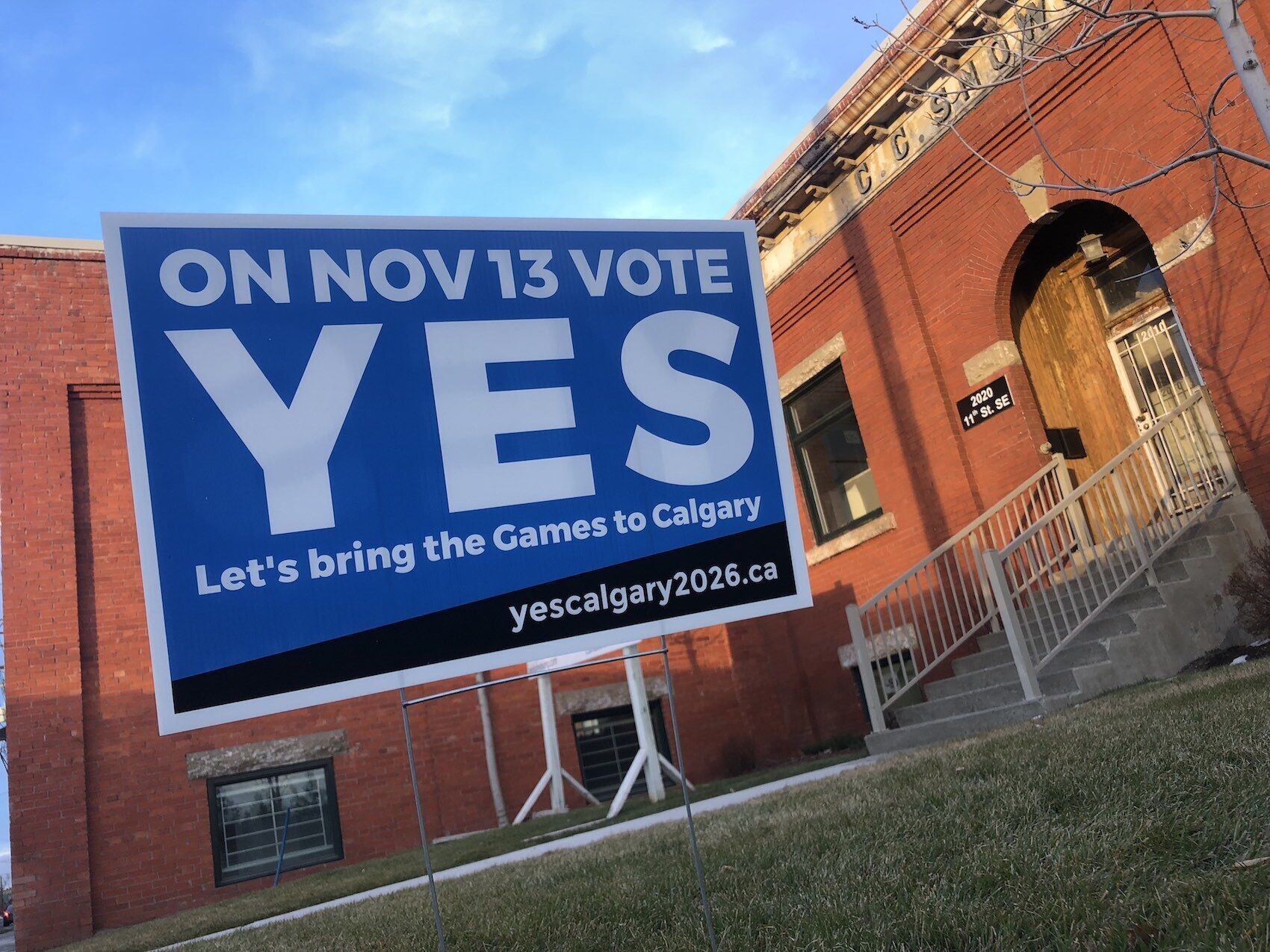
A return to city hall
Carter had crossed paths with Jyoti Gondek a handful of times before they both appeared, in separate segments, on Ryan Jespersen’s talk show on December 21, 2020. At the end of her interview, Jespersen asked Gondek if she would run for mayor; Gondek laughed, saying she hadn’t decided.
Later in the show, Jespersen asked Carter if he thought Gondek would have a good chance in a Nenshi-less race.
“I think that a female candidate running for mayor in Calgary is the prohibitive favourite, whether it’s Jyoti Gondek or another candidate,” said Carter. “I think Calgarians want a female mayor.”
“We’re looking for a different way of approaching government,” he continued. “It’s really exemplified by Jason Kenney. He’s bringing a very masculine approach to government: ‘You will do things my way!’ That’s not working for Calgarians right now.”
I heard ‘This will be the biggest mistake you make,’ and I heard, ‘This is the only way you will win.’
He later called Gondek and asked if she was going to run. She was thinking about it. They went snowshoeing in Bragg Creek, along with Heather McRae—this being a creative way to have a private meeting while observing coronavirus restrictions—and sealed the deal. Gondek joined the race; Carter became her campaign manager.
She cast around for opinions on Carter before making her decision.
“I heard ‘This will be the biggest mistake you make,’ and I heard, ‘This is the only way you will win,’” Gondek told me. “It’s all over the map.”
But most people agreed on one point.
“He is an amazing strategist,” says Gondek. “That’s just a fact.” Her description of what makes him so good at campaign strategy echoes what multiple others told me.
“[He] doesn't get rattled by little things that happen,” she says. “He gets the long game, tells everybody what it is, tells everybody who wants to listen what it is, doesn't care if the competitor knows what it is, because your strategy is your strategy and you stick to it and get it done.”
Gondek was not a well-known public figure and early polls had her in low single digits. But the campaign strategy was more concerned with raising her profile rather than presenting a different version of her.
“What you saw during the campaign was me,” says Gondek. “I had a campaign manager who allowed the ‘me’ to emerge, rather than trying to create some version of me.”
“We just simply defined her as the Kenney fighter,” says Carter now. He notes that she had been frequently tweeting criticism about Kenney before joining the race, and the campaign continued that. “I wrote a lot of those tweet steams. I wrote a lot of the ‘fuck you’ components of [them].”
The early front-runner, right-wing candidate Jeromy Farkas, was a first-term councillor, like Gondek. Thirty candidates declared for the mayor’s race, though not all of them made it to election day. It didn’t matter. Even with what Carter later said should have been a stronger challenge from fellow councillor Jeff Davison, the campaign ultimately came down to Gondek and Farkas. She won with 45% of the vote, 15 points ahead of Farkas.
I had a campaign manager who allowed the ‘me’ to emerge, rather than trying to create some version of me.
Gondek’s victory as the first woman mayor was a significant event for the city. But it was also important for Carter. He acknowledges that it had been quite some time since his last high-profile success, and the narrative of him as a campaign engineer par excellence emerged once again.
Many political watchers were surprised when he was given the chief of staff position. As Gondek tells it, the decision was a practical one for a mayor-elect who wanted to get up and running.
“Not knowing if you’re going to win or not means you don’t make a lot of those forward-thinking decisions, because you’re not sure where you’re at. I didn’t even have an outfit for the swearing-in, let alone a chief of staff already picked out,” she says. “With Carter having already run the campaign and having met the people that we knew could get certain roles done, it seemed like a logical choice.”
Carter was back in the role he thought he deserved—even if few others agreed.
“Every political person in the province had bets on how long he’d last as Gondek’s chief of staff,” one source told me. “Everyone knew he’d get fired because he can’t work with people.”
‘I think things are going well for me’
In 2015, Carter started a podcast called The Strategists with friends and fellow politicos Zain Velji and Corey Hogan. It quickly became a huge success, owing to its nerdy inside-baseball and astute analysis of Alberta and Canadian politics. But the secret sauce was the humour, banter and general piss-taking between the three.
The show presented Carter with a new platform: unlike tweets and newspaper quotes, or brief appearances on television and radio, the lengthy episodes and jovial atmosphere allowed him to offset his arrogance and ego (a running joke on the show) with his scathing, often self-deprecating humour.
Episode 948 aired three days after Gondek’s election, and the same day he was named chief of staff.
“My name is Zain Velji,” it began, “with me as always, Corey Hogan—and what the fuck are you still doing here, Stephen Carter?”
“I asked Jyoti if she cared, and she said, ‘I ain’t your mother,’” Carter quipped. “I think we’re in a really good spot, I think things are going well for me.”
“By the way, if your condo board is looking for a treasurer, Stephen Carter will be available in—how long, Carter? Six to nine months?” Velji continued.
“Might be after this podcast, I don’t know.”
“As you said, she is not your mother—but she can definitely fire you.”
If your condo board is looking for a treasurer, Stephen Carter will be available in — how long, Carter? Six to nine months?
Gondek’s victory had some of its thunder stolen by the revelation, shortly before the election, that incumbent Ward 4 councillor Sean Chu had engaged in sexual misconduct with a 16-year-old girl while he was a police officer in the 1990s. The explosive story and Chu’s subsequent re-election set the stage for a difficult start to the new council.
Gondek decided that, under the circumstances, she would not swear Chu in—a mostly symbolic move that would not impede Chu taking office. Carter was tasked with delivering the news to Chu. That meeting would result in Chu filing a formal complaint against Carter. Carter says Chu claimed he threatened to leak damaging information about Chu to the media over the following year.
“He said that I threatened him, that I was going to be releasing information throughout the four year [term],” said Carter. “I don’t know how he heard that. I told him directly what the mayor told me to tell him. She would not be swearing him in, and he would not be getting any support from the mayor’s office. I think I did so in a polite fashion. There were no raised voices.”
Chu did not respond to requests to comment for this story.
Two other formal complaints from councillors were also filed, by Sonya Sharp and Andre Chabot. Both declined to comment on the complaints, which were previously reported. Carter denies he did anything wrong.
“I can say whatever the hell I want to Sean Chu. I’m not in charge of him. There is no power imbalance between me and Sean Chu,” he says.
“Bullying requires a power relationship. I can’t bully fucking Sonya Sharp. She’s a councillor.”
I’m not in charge of him. There is no power imbalance between me and Sean Chu.
The complaint from Chabot centered on a tweet from Carter responding to Chabot’s defence of Chu.
“I’m sorry I hurt your feelings, Andre,” says Carter sarcastically. “You know, don’t defend a child molester. Try not to do that. I have no problem with what I said to Andre Chabot and his defence of Sean Chu. He wants to stand on that side, I will fucking kill him. I’ll make sure that he never gets elected again. You stand on the side of a child molester? A rapist? Give me a break.”
(Chu was not charged with a criminal offence in that case. The age of consent is normally 16, but it is 18 when the adult is an authority figure. An internal police investigation reprimanded him, and he continued to serve as a uniformed officer.)
On February 2, Tom Ross of CityNews separately asked both Carter and Gondek about the bullying allegations and formal complaints. Carter was fired that same day.
“I walked into a meeting that I thought was about personal security,” says Carter. “There were two human resources professionals, and Jyoti. She read to me a two sentence paragraph and walked out of the room.... It’s one of the most cold things I’ve ever been involved with. I couldn’t believe it. I still can’t believe it.”
He had been chief of staff for 104 days.
I haven’t spoken to her since. She’s dead to me. She’s won this election, and this is the last one she wins.
One month earlier, he’d said that Gondek was the best candidate he’d ever worked with, raving about the closeness of their relationship. In a tweet confirming his dismissal, Carter said, “I loved working with @JyotiGondek and expect she will achieve great things.” But in a statement, he threatened legal action “if dispersions about me and my character continue.”
His feelings towards Gondek are less mixed today.
“I haven’t spoken to her since,” Carter says. “She’s dead to me. She’s won this election, and this is the last one she wins.”
The severance package Carter received was $104,166.65, which received a great deal of criticism at the time, much of it directed at Carter himself. Some even made allegations that, given that this was the second big payout of public money he’d received after flaming out of a high-profile chief of staff position, perhaps he’d engineered the whole situation.
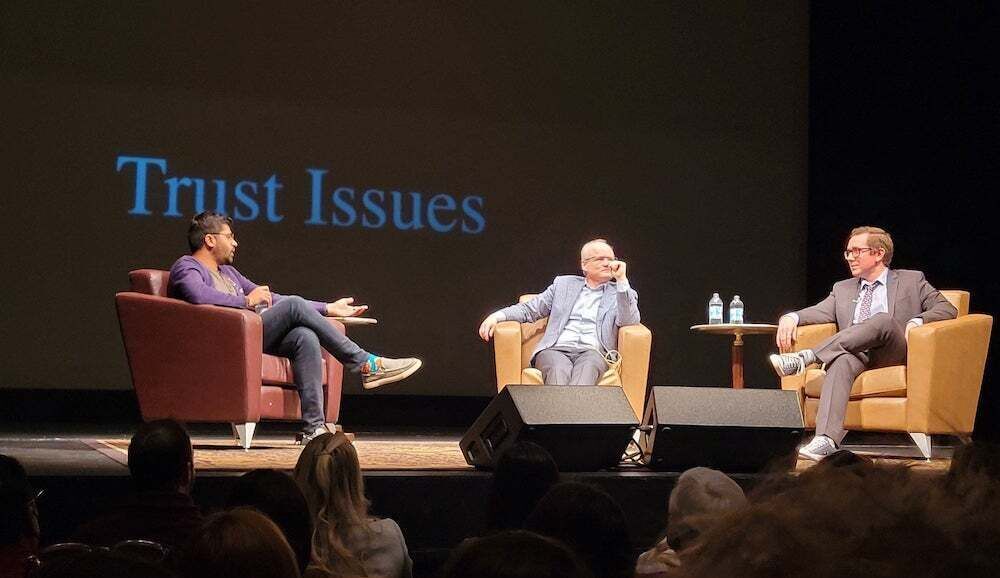
But the amount paid, as with his previous severance when fired by Redford, was written into the contract for the position as a standard proviso, relative to the considerable base salary—more than $300,000 annually under Redford.
On this particular point, the blame seems not to lie primarily with Carter himself. Instead, it’s fair to question just how lucrative the salaries of public servants should be. It’s also fair to question the judgment of the people—Gondek and Redford—who hired Carter, only to fire him months into his contract, triggering the severance payout.
Carter says his plan was to work with Gondek for two terms, build up a pension with the city, and retire. “I would be able to go off and work in the arts or something, being an administrator for a small theatre company in Kelowna,” says Carter. “You know, slow down, don't have to worry about it. Not have to chase contracts.”
Now, he says, no one will ever give him that job again—a job he insists he was good at.
“I didn't ask to be fired,” says Carter. “I didn't do anything to get fired. Now, others might say I did. That's fine… but my intent was not to be fired. My intent was to do the best possible job I can do for the people that I served.”
The parting shot
I’ve been so engrossed in what Carter is saying that I’ve hardly noticed the other patrons in the café coming and going over the past three hours. As we’re wrapping up the interview, I ask Carter something I’ve been trying to figure out for days.
“Why’d you do this?”
His back-and-forth about the interview, from the playful proactive reaching out to seeming to play hard-to-get, left me confused about why (or even whether) he would speak to me. Whatever I expected from the actual conversation, it was not three hours of attacking enemies, airing grievances, crying injustice, and generally saying things that most people of his profile and profession would hesitate to say into a recorder.
As if wondering the same thing himself, Carter leans back in his chair and thinks about the question for quite some time before answering.
It’s not an answer. Or rather, it’s ad hominem attacks disguised as an answer.
“Because you’re not Jeremy Appel.” He’s referring to a piece about Carter’s “top five scandals” that local journalist Jeremy Appel published in May, which he’s already complained about during this interview.
“Jeremy’s the turd you wipe off your shoe when you step in it. He doesn’t have the capacity to think it through. It’d be like talking to Rick Bell,” he says, mentioning the veteran Calgary Sun columnist who took him to task while he was Redford’s chief of staff. “Why would I talk to Rick Bell? He’s going to write the story he’s going to write, and that story is going to be filled with single monosyllabic words that are compiled into single sentence paragraphs that just play to a certain base.”
It’s not an answer. Or rather, it’s ad hominem attacks disguised as an answer.
“Imagine saying something as stupid as ‘no comment.’ To a journalist. Like, if I wanted to, I could say nothing in three sentences. Then you’d report that nothing that I said instead of ‘no comment.’”
He’s said a lot more than nothing, even if he doesn’t realize it—though I suspect he does. As long as his audience’s reaction validates either his ego or his victimhood, Stephen Carter wants to talk. He has to. He can’t help it.
Taylor Lambert is a freelance journalist based in Calgary.
Support independent Calgary journalism!
Sign Me Up!The Sprawl connects Calgarians with their city through in-depth, curiosity-driven journalism. But we can't do it alone. If you value our work, support The Sprawl so we can keep digging into municipal issues in Calgary!




